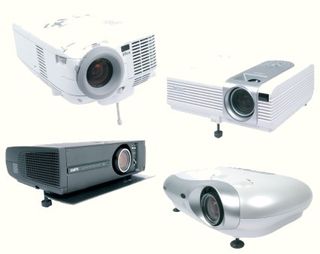Video Projectors: Evolving Towards High Definition
2005 - The Year Of HD?

Now that the first wave of 16:9 video projectors has passed, new models are arriving, all of them able to display High Definition (HD) signals. HD is in fact a generic term for all types of signals whose resolution is higher than standard video images with a resolution of 720 pixels wide by 480 (NTSC) or 576 (PAL) lines. For the moment, there is no real HD standard - the US uses a system called ATSC, whereas Europe uses DVBS. To better understand the difference between an NTSC 525-line or PAL 625-line signal and the HDTV format, you have to keep in mind that the resolution is doubled horizontally as well as vertically. So theoretically the image is four times better in terms of resolution.
Towards A Single HDMI Connector
To display HD images, video projectors must be 720p- and 1080i-compatible, but they also need to accept input via HDMI, DVI, or YUV connectors. The HDMI (High Definition Multimedia Interface) input has been under development by the HDMI Working Group since 2003 - its members are Sony, Hitachi, Silicon Image, Philips, and Toshiba. The HDMI connector, which is more compact than the DVI, transfers digital data with a bandwidth of several gigabits per second, and can handle resolutions of 1920x1080 pixels (HDTV) without compression. Video signals can also be 1080i, 720p, 576p, 480p, etc. - in other words, all existing formats. And, HDMI also carries audio signals, like multichannel Dolby Digital and DTS from DVD video, but also audio CD, and DVD-Audio sources. It's a kind of super Peritel/SCART connector.
In contrast DVI (Digital Video Interface) carries only the flow of data connected with the image, with the same resolutions as HDMI.
Stay On the Cutting Edge: Get the Tom's Hardware Newsletter
Get Tom's Hardware's best news and in-depth reviews, straight to your inbox.

Redditor allegedly purchased two Intel Arc B570 GPUs at Micro Center days before the official launch — the CPU couldn't recognize the GPUs due to the lack of driver support

Spanish retailer lists RX 9070 and RX 9070 XT GPUs, though the prices might be mere placeholders — RX 9070 for $912 and RX 9070 XT for $1,097
Most Popular

